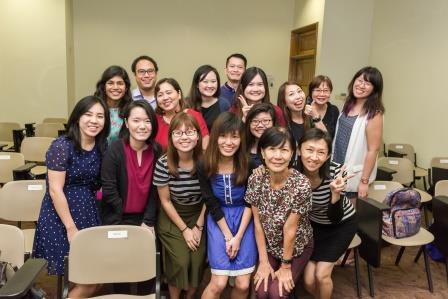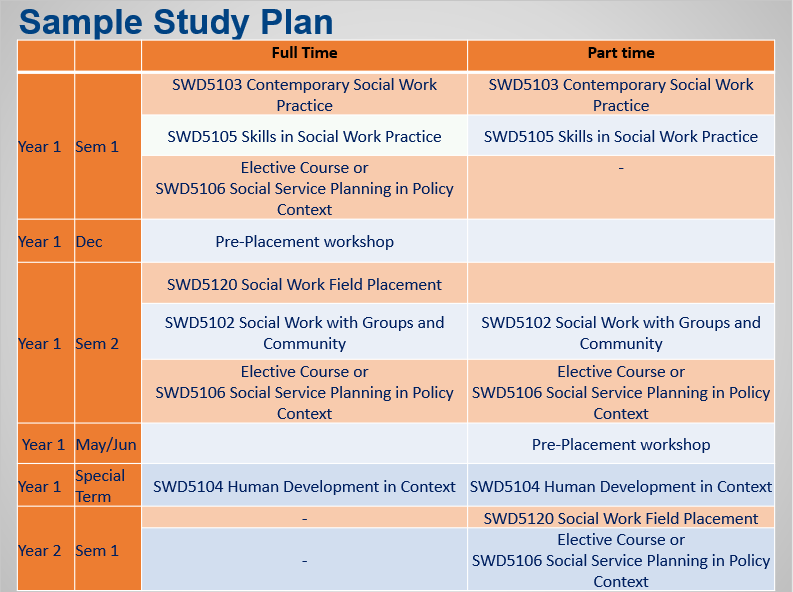The Programme
The GDSW programme was launched in 1999 and is for persons holding non-social work degrees. They are typically currently working in social service sector or planning to switch into social work.
For Students Admitted from AY 2024/25 onwards
A candidate for the Graduate Diploma in Social Work must offer not fewer than six courses and a social work field placement.
The Graduate Diploma in Social Work programme comprises the following components:
- 5 Core courses*
- 1 Elective course
- 1 Social Work Field Placement
*Candidates possessing a recognised social work academic qualification may be exempted from one or more essential courses if they had already done similar courses in their undergraduate degree. The exempted core course(s) will be replaced with elective course(s) as approved by the Head of Department of Social Work.
|
Core Courses
|
|
Elective Courses
Note: Not all elective courses are necessarily available in any one year. |
|
Social Work Field Placement
Candidates are required to attend a six-hour pre-placement workshop, and fulfil 400 fieldwork hours which include field seminars and unpaid placement in a social service agency under an approved supervisor. The fieldwork hours are typically undertaken in an agency outside the candidate's work place. The candidate is only allowed to take the Social Work Field Placement if he/she have completed and passed the pre-requisite courses: SWD5103 and SWD5105. Click here for the Field Placement Manual and Forms (NUS login required) |
|
|
| Coursework Programme | Normal Candidature | Maximum Candidature | ||
| Full-Time Study (in years) | Part-Time Study (in years) | Full-Time Study (in years) | Part-Time Study (in years) | |
| Graduate Diploma in Social Work | 1 | 1.5 | 2 | 3 |
Students who exceed their normal candidature will have to pay full, non-subsidised fees, during their extended semesters. The workload of a full-time student is between 3-5 courses in a semester, while the workload of a part-time student is between 1-3 courses in a semester.
Students Admitted from AY2024/25Complete and pass:
|
Students Admitted from AY2020/21 to AY2023/24Complete and pass:
|
Continuation RequirementsWith effect from AY2015/2016, students who do not meet the minimum grade of a course may repeat:
|
Admissions
Intake is once a year in August.
|
Application Period The application period is from 1 August (in the year preceding the intake) to 15 January (in the same year as the intake). Please check this link at https://fass.nus.edu.sg/prospective-students/graduate/coursework-programmes/application-process-gradcoursework/ for available programmes in August. |
|
Application Outcome The outcome of application will be made known by 31 May for intake in August. |
|
Referees Both academic referees and professional referees are accepted for the application. There should be at least 2 referees for the application. |
Admission RequirementsFor admission as a candidate for the Graduate Diploma in Social Work, a person must be a graduate of this University or such graduate of another university as a Senate may approve, and must have obtained either:
or
or
*A candidate must submit evidence of his/her volunteering experience as supporting documents, together with the application. A verification letter is preferred. |
||||||||
English Language ProficiencyApplicants whose native tongue or medium of university instruction is not English should submit their TOEFL (Test of English as a Foreign Language) or IELTS (International English Language Testing System) score as evidence of their proficiency in the English language.
TOEFL or IELTS results are only valid for two years after the test and the validity should not expire before the beginning of the application period for the coursework programme. The Faculty's TOEFL institution code is 9081. The Educational Testing Service (ETS) has indicated that score reports are valid only if our University receives them directly from ETS. |
||||||||
General InformationPlease refer to https://fass.nus.edu.sg/prospective-students/graduate/coursework-programmes/application-process-gradcoursework/ for general information on the application periods, application materials, fees and etc. |
||||||||
Fees and Scholarships
Regular Semester
Fees are chargeable for students on coursework programme reading SWD5102, SWD5103, SWD5105, SWD5106, SWD5120 and one elective course. The listed fees is for students admitted in AY2025/26.
| Fee payable by students in receipt of MOE subsidy (per semester) |
Fee payable by students not in receipt of MOE subsidy (per semester) |
||
| Singapore Citizens | Singapore Permanent Residents | Singapore Citizens | Singapore Permanent Residents and International Students |
| Full-time/ Part-time |
Full-time/ Part-time |
Full-time/ Part-time |
Full-time/ Part-time |
| S$4,800/ S$2,400 |
S$8,200/ S$4,100 |
S$18,250/ $9,125 |
S$18,550/ S$9,275 |
Special Term
Fees are chargeable for students on coursework programme reading SWD5104 in special term. The listed fees is for students admitted in AY2025/26.
| Fee payable by students in receipt of MOE subsidy (during special term) |
Fee payable by students not in receipt of MOE subsidy (during special term) |
||
| Singapore Citizens | Singapore Permanent Residents | Singapore Citizens | Singapore Permanent Residents and International Students |
| S$960 | S$1,640 | S$3,650 | S$3,710 |
An example of a part-time Singaporean student completing the programme in 3 semesters (or 1.5 years):
(S$2,400 x 3 semesters) + S$960 (special term) = S$8,160
Notes:
- GST will be fully absorbed by MOE for students in receipt of MOE subsidy who are Singapore Citizens and Singapore Permanent Residents. Students who are not in receipt of MOE subsidy will have to pay the non-subsidised fee amounts (which are inclusive of the prevailing GST). For more information on tuition fees, please refer to here.
- Full-time and part-time students are charged on a per Unit basis based on the respective full-time student rates, for courses they read during the Special Term. The fee calculation is based on a 4-unit course for SWD5104.
- All Singaporeans aged 25 and above may use their S$500 SkillsFuture Credits from the government.
- Students who are Singapore Citizens and aged 40 and above (based on the year which the student turns 40 years old) may be eligible for higher subsidy under the SkillsFuture Mid-Career Enhanced Subsidy. Students who are not eligible for MOE subsidy are also not eligible for the SkillsFuture Mid-Career Enhanced Subsidy. For more information regarding SkillsFuture Credits, please refer to http://www.myskillsfuture.gov.sg/.
- For more information on fees and subsidies, please refer to the Fees page ⇒ MOE-subsidised Programmes ⇒ Notes.
For scholarships that are relevant for the Graduate Diploma in Social Work, you can refer to the following for more information on the criteria, application procedures, application periods, etc.
Admin
| Position | Name | |
| Master & PhD (Research) Coordinator | Assoc Prof Srinivasan Chokkanathan | swksrini@nus.edu.sg |
| Master (Coursework) Coordinator | Prof Irene Ng | swknyhi@nus.edu.sg |
| Graduate Diploma Coordinator | Prof Irene Ng | swknyhi@nus.edu.sg |
| Field Placement Director | Assoc Prof Peace Wong | swkwyj@nus.edu.sg |
| Graduate Field Placement Coordinator | Ms Sophie Cheng | sophie.cheng@nus.edu.sg |
Examination Matters
- No notices
Student Project/ Research
- Research Ethics Guidelines
- Claim for Student Research Projects
- 1. Guidelines on Student Project Fund
- 2. For reimbursement of claims, students are to complete and submit the following forms (hard and soft copies) to the respective administrator at the Department General Office at AS3 Level 4 for payment processing.
- i) Request for Payment Form (the fields that need to be filled up are highlighted in YELLOW)
- ii) Student Project Expense Claim Form
Other Matters
Testimonials
| Name: | Mr Yahya Abdul Razak |
| Programme: | Graduate Diploma in Social Work |
| Year: | 2023 |
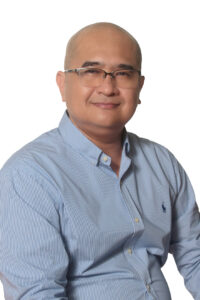
I am writing to express my utmost gratitude and appreciation for the exceptional social work graduate diploma course that I recently completed at your esteemed faculty. It has been an incredibly transformative and enriching experience, one that I am truly thankful for.
Throughout the duration of the program, I was consistently impressed by the depth and breadth of the curriculum. The course content was comprehensive and well-structured, covering a wide range of topics relevant to the field of social work. The engaging lectures, thought-provoking discussions, and practical assignments truly challenged and expanded my understanding of social work theory and practice.
One aspect that truly stood out to me was the exceptional faculty members who guided us throughout the course. Their expertise, dedication, and genuine passion for social work were evident in every class. They were always approachable, willing to provide support and guidance whenever needed. Their mentorship played a pivotal role in shaping my academic and professional journey.
I also want to acknowledge the invaluable resources and facilities provided by the institution. The well-stocked library, extensive research databases, and access to cutting-edge technology greatly enhanced my learning experience. Additionally, the institution's commitment to providing practical learning opportunities, such as my part-time field placement at Ang Mo Kio Family Service Centre (FSC) under Youth Infinity, allowed me to apply the knowledge and skills learned in the classroom to real-world situations.
The practical application aspect of the course was truly outstanding. The various case studies, group projects, role-plays and presentations provided me with invaluable hands-on experience. These experiences not only helped me develop crucial skills in social work but also instilled in me a deep sense of empathy and compassion towards the individuals, families, and communities I aim to serve.
When I embarked on this journey, I knew that social work was much more than just a career. It is a calling to make a difference in the lives of others. As a primary school teacher, I have encountered many cases of students with Long-Term Absenteeism or LTA. I wished that I have the necessary skillsets to help and uplift these students to come to school often so that they can sit for their PSLE examinations and move on to their secondary school eventually. Most of these at-risk students come from the rental flats of Jalan Kukoh, Jalan Minyak, York Hill and Spooner Road estates. Coming from a humble beginning myself, living in a rental flat when I was young in Kim Tian road, I can resonate and empathise with these students. Hence, this GDSW programme caught my attention!
One of the most memorable module that I enjoyed was the Contemporary Social Work Practice. In that module, I was introduced to the techniques of Motivational Interviewing (MI) by Mr Alvin Chua. I began to research more about it and use it in my school for my Action Research Professional Learning Communities (PLC) project. The aim was to motivate these students in their learning of the Science subject and improve their behaviours cum attitudes towards school. So, my colleagues were guided by me via a book; Motivational Interviewing in Schools by Rollnick. We did a pre-survey and a post-survey with the intervention group and control group. The results were amazing during those eight months, their attendance starts to improve and their interest towards the learning of Science subject also improved.
My aspiration is to go into school social work research by taking up a second masters degree in the Social Work Research masters program in NUS. This is to further my interest in qualitative and quantitative social research methodologies and furthermore I can capitalize on my previous experience as a research associate at National Institute of Education, Nanyang Technological University. Seize the Day!
I am delighted to share that the course has had a profound impact on my career prospects. The knowledge, skills, and practical experiences gained have positioned me as a competent and confident professional in the field of social work. The course's emphasis on ethics, cultural competence, and social justice has greatly influenced my approach to practice, enabling me to make a meaningful difference in the lives of those I serve.
Once again, I would like to express my sincere gratitude for the exceptional social work graduate diploma course. It has been an incredible journey of growth, learning, and self-discovery. I am truly grateful to have been a part of such a remarkable program. Thank you for providing me with the opportunity to pursue my passion for social work and equipping me with the necessary skills to create positive change in the world. We have spent countless hours in classrooms, immersed in theories and academic knowledge, but it is the experiences outside those walls that have truly shaped us into the compassionate and empathetic individuals we are today. Together, we will tackle some of the most pressing social issues of our time: poverty, inequality, mental health and so much more. We have learned to navigate complex systems, to advocate for those who are marginalized, to be a voice for the voiceless and empower those we served with creative solutions. The power of change begins with us. We have the power to break down barriers and to create a society that is more inclusive, equitable and just. But this is just beginning. As we step into the world as social work professionals, the road ahead may be filled with obstacles, but let us embrace them with open hearts and minds. Let us never forget the importance of self-care, for we cannot pour from an empty cup. Let us be lifelong learners, continuously seeking new knowledge and skills to better serve our communities. All the best to the future cohorts!
| Name: | Mr Ng Yong Hao |
| Programme: | Graduate Diploma in Social Work |
| Year: | From 2015 to 2016 |
 Quality teaching was Mr Ng Yong Hao’s main driving force to apply for the Graduate Diploma in Social Work programme at the National University of Singapore, for it takes skill to work with those who are suffering, marginalised, and disenfranchised. He learnt tremendously from his lecturers and Field Supervisor, who share a depth of experience in Social Work practice.
Quality teaching was Mr Ng Yong Hao’s main driving force to apply for the Graduate Diploma in Social Work programme at the National University of Singapore, for it takes skill to work with those who are suffering, marginalised, and disenfranchised. He learnt tremendously from his lecturers and Field Supervisor, who share a depth of experience in Social Work practice.
Yearning to further develop his skills and knowledge in working with people, Mr Ng Yong Hao applied to be a part-time student at the National University of Singapore (NUS) Graduate Diploma in Social Work (GDSW) programme. A researcher and programme administrator at the NUS Chua Thian Poh Community Leadership Programme (CTPCLP), his job involved studying the landscape of youth organisations in Singapore, as well as mentoring undergraduates in their community and research projects.
“It showed me the importance of front line work. Watching the undergraduates collaborate and work with marginalised clients, inspired me to jump in! In addition, I realised that people are influenced by familial, communal, and societal factors. Therefore, I hoped to learn about systemic interventions from the Social Work field,” said Yong Hao, who is also a professional coach certified by the International Coach Federation.
Quality teaching was Yong Hao’s main driving force to apply for the GDSW programme at his alma mater. “While pursuing my Bachelor of Science degree, I had taken some electives offered by the Department of Social Work. As such, I knew I would be able to learn from faculty members who had a depth of experience.” With the longest history of conducting Social Work research in Singapore and a strong capacity in that arena, it was also the best place for Yong Hao to further explore his interest in research.
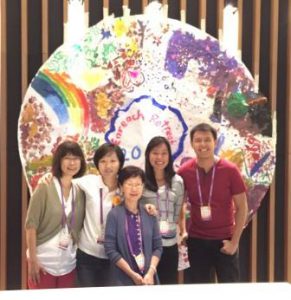
The GDSW programme helped Yong Hao clarify his assumptions and beliefs. “I developed a greater awareness of the values that I possessed. This was a critical and essential endeavour because values will heavily inform our interactions with clients, who may be marginalised, disenfranchised, and hold beliefs that are radically different from ours.”
Through his practicum at the National Cancer Centre Singapore (NCCS), Yong Hao came to see the importance of journeying with cancer patients and their caregivers. Upon completing the GDSW programme, he joined NCCS as a Medical Social Worker cum Programme Executive.
“My practicum and field practice seminars at NUS provided a platform to consolidate and apply what I had learnt. As an intern, it was a space to reflect on my practice. My Field Supervisor from NCCS imparted a tremendous amount of skills and knowledge. Interacting with him was invaluable to my development,” he said.
In Social Work practice, the use of Self refers to the combining of knowledge, values and skills gained in Social Work education with aspects of one’s personal self, including personality traits, belief systems, life experiences, and cultural heritage. (Dewane (2006) cited by Walters (2008)) “The use of Self is an often underplayed fundamental in the profession. An excellent supervisor is able to help a Social Worker to work on Self. This is key to becoming a skilful Social Worker,” he added.
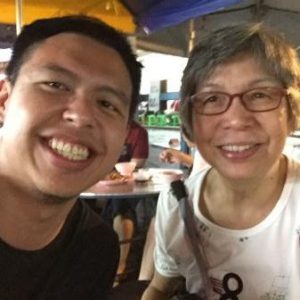 Yong Hao grew immensely through the 18-month GDSW programme. “It was a short, but intensive programme to become a full-fledged Social Worker. One valuable takeaway was resilience. Balancing family, work and part-time studies, was tough. But, the experience showed me that it is possible!”
Yong Hao grew immensely through the 18-month GDSW programme. “It was a short, but intensive programme to become a full-fledged Social Worker. One valuable takeaway was resilience. Balancing family, work and part-time studies, was tough. But, the experience showed me that it is possible!”
Reference:
Walters, H. B. (2008). An Introduction to Use of Self in Field Placement. The New Social Worker.
| Name: | Ms Lim En Yin, Amanda |
| Programme: | Graduate Diploma in Social Work |
| Year: | From 2016 to 2017 |
Ms Lim En Yin, Amanda’s passion in the social service sector started 8 years ago, where she had to work with youth-at-risk, families in need of financial assistance, and other interprofessional issues. As a young entrant in the field then and having to manage clients with a wide array of presenting problems, Ms Lim En Yin, Amanda realised the importance of grounding her work with social work knowledge. “Admittedly when I first started, I had relied a lot on my gut feelings to guide me in my interaction with clients”, Ms Lim En Yin, Amanda explained. It was this sense of inadequacy that spurred her to pursue a Graduate Diploma in Social Work (GDSW) at the National University of Singapore.
Amanda grew immensely through the GDSW programme, which included a wide array of learning pedagogies such as lectures, a 400-hour field practicum, and a practicum seminar. For Amanda, these different pedagogies served to enrich her learning experience and is invaluable to hone the competencies required of a Social Worker.
“The modules had developed professional capabilities by equipping me with not just knowledge on theoretical frameworks and concepts, but also on essential skills in communicating with clients”, said the Senior Youth Guidance Officer at the Ministry of Social and Family Development. She further added that her field practicum at the Big Love CPSC has provided her an opportunity to “utilize the knowledge and skills learnt through the course”, in a “safe and guided setting”. During the practicum, she is grateful that her supervisor had constantly challenge her to reflect on her practice by grounding it on theoretical frameworks and concepts. To further support her practicum learning, Amanda also had to attend the practicum seminar, which she felt was a good platform for her to share her “takeaways and reflections from the practicum experience”.
One major challenge that Amanda faced during her current work at the residential care setting is to strike a balance between catering to the individual needs of the youth and ensuring fairness in discipline. Through her practicum, Amanda gained insight on the importance of rapport building with her youths, which has helped her to be more effective in working with them, moving forward.
Besides her professional growth, the GDSW has also helped Amanda to develop at a personal level. She shared that she is now more mindful of her interaction with her loved ones and has developed a sense of empathy towards people around her.
Reflecting on her GDSW journey, Amanda fondly recalls how the support from her peers and the many friendships forged, have helped her to cope with the challenges of having to juggle between her work, family commitments and her part time study. For her, these challenges grew dim, in light of her goal as a Social Worker, which is to make a difference in the lives of others.
| Name: | Ms Ranitha Govindasamy |
| Programme: | Graduate Diploma in Social Work |
| Year: | From 2016 to 2017 |
Armed with a Bachelor in Sociology, Ms Ranitha Govindasamy, who enjoyed learning, thought that she was finally done with the classroom as she was eager to put her knowledge and skills to use at the working world. Yet, after starting work at the Social Service Sector, she soon began to miss the excitement of learning. Thus, Ms Ranitha Govindasamy enrolled in the Graduate Diploma in Social Work (GDSW) programme in 2016. According to her, the GDSW programme is the best of both worlds as it offered her the opportunity to marry learning with practice.
A medical social worker at the National Cancer Centre Singapore, Ranitha shared that the programme has helped her to ground her daily work with social work theories. She has also observed a marked improvement in her skills set, which has helped her to deliver her services to her clients more effectively.
She particularly recalled that she had learnt about the cycle of violence during one of the modules in class. This new knowledge soon served to be empowering for her when she had to work with a victim of domestic violence. She felt that she was better equipped to work with the client and was able to understand the situation of the client, through a theoretical lens. For Ranitha, the content taught in the GDSW programme had a lot of practice relevance at her workplace.
The interplay between learning and practice is very much evident for Ranitha, who engages in reflective practice at her workplace. With the critical thinking skills honed during the programme, Ranitha shared that she would now often reflect upon her communication with her clients or whether there are areas of improvement in her work with clients, in order to better serve her clients.
One feature about the GDSW programme which stood out for Ranitha, was the dynamism in the classes she had attended. As her classmates were mostly part time students who are working at the various settings within the Social Service Sector, Ranitha felt that this diversity was a learning platform for her to find out about the various roles of Social Workers at the different settings. Hence, besides learning about the profession from her lecturers, this element of peer learning was refreshing and meaningful for her. She also shared that the 400-hour field practicum in which she had to practice at an organisation other than her workplace, has helped to broaden her perspectives about the profession and the field.
Reflecting on her time in the GDSW programme, Ranitha was heartened that the support from her peers has helped her to cope with some challenging times. She is confident that this peer support will continue as they embark on their adventure as social workers.
In all, the GDSW programme was enriching for Ranitha and she appreciates the NUS Department of Social Work as well as the lecturers for being a part of her Social Work journey.
